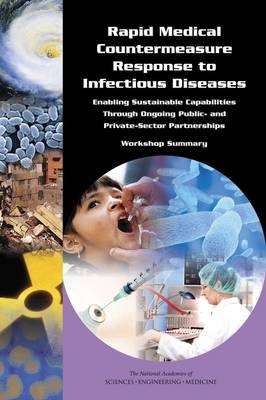
Rapid Medical Countermeasure Response to Infectious Diseases
Enabling Sustainable Capabilities Through Ongoing Public- and Private-Sector Partnerships: Workshop Summary
Seiten
2016
National Academies Press (Verlag)
978-0-309-37861-1 (ISBN)
National Academies Press (Verlag)
978-0-309-37861-1 (ISBN)
Emerging infectious disease threats that may not have available treatments or vaccines can directly affect the security of the world's health since these diseases also know no boundaries and will easily cross borders. Sustaining public and private investment in the development of medical countermeasures (MCMs) before an emerging infectious disease becomes a public health emergency in the United States has been extremely challenging. Interest and momentum peak during a crisis and wane between events, and there is little interest in disease threats outside the United States until they impact people stateside.
On March 26 and 27, 2015, the Institute of Medicine convened a workshop in Washington, DC to discuss how to achieve rapid and nimble MCM capability for new and emerging threats. Public- and private-sector stakeholders examined recent efforts to prepare for and respond to outbreaks of Ebola Virus Disease, pandemic influenza, and coronaviruses from policy, budget, and operational standpoints. Participants discussed the need for rapid access to MCM to ensure national security and considered strategies and business models that could enhance stakeholder interest and investment in sustainable response capabilities. This report summarizes the presentations and discussions from this workshop.
Table of Contents
Front Matter
1 Introduction
2 A Wake-Up Call: The 2014 Ebola Outbreak Response
3 Preparedness as an Issue of National Security
4 Rapid Development of Ebola Vaccines
5 Influenza Risk Assessment and Pandemic Preparedness
6 Developing MCMs for Coronaviruses
7 Sustainable Business Models to Ensure Rapid and Nimble Responses
8 Supporting MCM Development Across Threats and Funding Cycles
A References
B Acronyms and Abbreviations
C Statement of Task
D Agenda
E Biosketches of Invited Speakers and Facilitators
On March 26 and 27, 2015, the Institute of Medicine convened a workshop in Washington, DC to discuss how to achieve rapid and nimble MCM capability for new and emerging threats. Public- and private-sector stakeholders examined recent efforts to prepare for and respond to outbreaks of Ebola Virus Disease, pandemic influenza, and coronaviruses from policy, budget, and operational standpoints. Participants discussed the need for rapid access to MCM to ensure national security and considered strategies and business models that could enhance stakeholder interest and investment in sustainable response capabilities. This report summarizes the presentations and discussions from this workshop.
Table of Contents
Front Matter
1 Introduction
2 A Wake-Up Call: The 2014 Ebola Outbreak Response
3 Preparedness as an Issue of National Security
4 Rapid Development of Ebola Vaccines
5 Influenza Risk Assessment and Pandemic Preparedness
6 Developing MCMs for Coronaviruses
7 Sustainable Business Models to Ensure Rapid and Nimble Responses
8 Supporting MCM Development Across Threats and Funding Cycles
A References
B Acronyms and Abbreviations
C Statement of Task
D Agenda
E Biosketches of Invited Speakers and Facilitators
1 Front Matter; 2 1 Introduction; 3 2 A Wake-Up Call: The 2014 Ebola Outbreak Response; 4 3 Preparedness as an Issue of National Security; 5 4 Rapid Development of Ebola Vaccines; 6 5 Influenza Risk Assessment and Pandemic Preparedness; 7 6 Developing MCMs for Coronaviruses; 8 7 Sustainable Business Models to Ensure Rapid and Nimble Responses; 9 8 Supporting MCM Development Across Threats and Funding Cycles; 10 A References; 11 B Acronyms and Abbreviations; 12 C Statement of Task; 13 D Agenda; 14 E Biosketches of Invited Speakers and Facilitators
| Erscheinungsdatum | 29.02.2016 |
|---|---|
| Verlagsort | Washington |
| Sprache | englisch |
| Maße | 152 x 229 mm |
| Themenwelt | Medizin / Pharmazie ► Medizinische Fachgebiete ► Notfallmedizin |
| Studium ► Querschnittsbereiche ► Infektiologie / Immunologie | |
| Studium ► Querschnittsbereiche ► Prävention / Gesundheitsförderung | |
| ISBN-10 | 0-309-37861-3 / 0309378613 |
| ISBN-13 | 978-0-309-37861-1 / 9780309378611 |
| Zustand | Neuware |
| Informationen gemäß Produktsicherheitsverordnung (GPSR) | |
| Haben Sie eine Frage zum Produkt? |
Mehr entdecken
aus dem Bereich
aus dem Bereich
Buch | Softcover (2023)
Lehmanns Media (Verlag)
CHF 27,90


